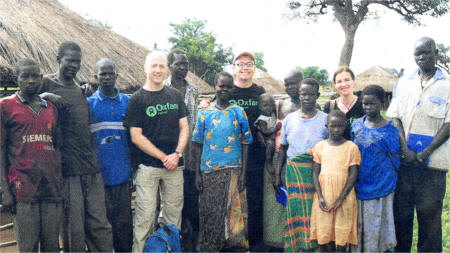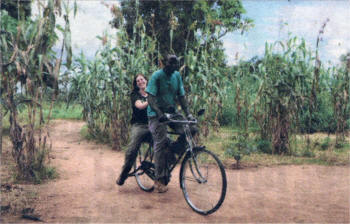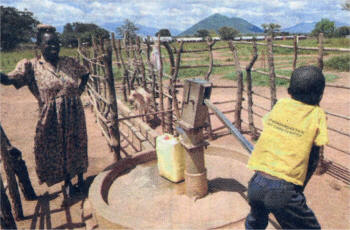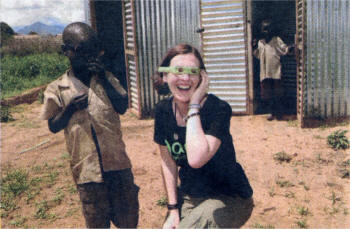|
MORTON NEWSPAPERS JOURNALIST NIALL CROZIER IN
KITGUM WITH OXFAM IRELAND

SHOWING THE COLOUR...
Oxfam Ireland's KD Ryan and Paul Dunphy
wore the charity's T-shirts whilst
visiting the Palabek Gem transit camp
where people have received gifts of
goats and cattle, again available in the
Christmas 2008 'Unwrapped' catalogue.
 EACH
of us has grown up in a world in which Africa - despite its vast
size and abundance of natural resources - appears to confirm the
Scriptural adage that the poor shall always be with us. EACH
of us has grown up in a world in which Africa - despite its vast
size and abundance of natural resources - appears to confirm the
Scriptural adage that the poor shall always be with us.
Perhaps, in the bigger scheme of things, the
real purpose of it being so is to challenge those of us
fortunate enough to have been born on the more privileged side
of the track - materially at any rate -and remind us that we
are, indeed, our brothers' keepers.
Never having been to Africa, I accepted an
invitation to visit Kitgum in northern Uganda, there to see
firsthand the work done by Oxfam Ireland and witness the
practical outworking and benefits of that charity's 'Unwrapped'
gift scheme.
I did so as one who has already subscribed to
alternate gift schemes whereby rather than buying another pair
of socks for a getting-on-in-years male relative who probably
has more of the said-footwear than the Pringle company, instead
you spend that money on something of prospect-enhancing,
potentially life-changing value for someone whose need is
greater than that of your Uncle Tom, Dick or Harry.
Realistically, how many pairs of socks can he need?
And is there really any point in another bottle
of toilet-water for Aunt Edna when there are millions of people
in hundreds of places like Kitgum who have neither water nor
toilets? Big questions. Especially at Christmas when we tend to
buy all manner of things for people who neither want nor need
them.
Ahead of the trek in mid-October - the latter
stages of East Africa's wet season -we were jabbed to immunize
us against a variety of ailments and prescribed anti-malaria
drugs.
By 'we' I mean a party of five: Oxfam Ireland's
KD Ryan and Paul Dunphy, singer-songwriter Eleanor McEvoy - most
notably of Women's Heart fame - Dublin-based photo-journalist
Kim Haughton and myself, the sole northerner.
 So
down to Dublin for a pre-trip briefing at Oxfam Ireland's Burgh
Quay headquarters and a first ever meeting with those who were
to be my companions. So
down to Dublin for a pre-trip briefing at Oxfam Ireland's Burgh
Quay headquarters and a first ever meeting with those who were
to be my companions.
Passport; check. Visa; check. Money changed -
to US dollars, of all things; check. (Once in Africa, dollars
are changed to Ugandan shillings, 20,000 of which are worth
about �6.80).
Ten days later, four of us - Kim, who had a
prior engagement, followed - met at Dublin Airport for the first
of four flights en route to Kitgum: Dublin-Amsterdam,
Amsterdam-Nairobi, Nairobi-Entebbe, Entebbe-Pader.
The first, third and fourth of those flights
are quite short. The second is 4,150 miles, so even at a speed
of 520mph it's an eight-hour overnight ordeal during which you
get little or no sleep.
However, a compensatory plus was the fact that,
as we crossed the equator en route to Nairobi, the dark cloud
formed a stunning silhouette against the fire of an orange/red
early-morning sky. Stunningly beautiful and a moment which makes
the fatigue worthwhile.
Below was land of unexpected verdure. It's
lush and it's green, which, given East Africa's well-documented
droughts and seemingly insoluble food shortages, is something of
a paradox. Just the first of a great many, I am to discover.
From the capital of Kenya to Entebbe, which is
the airport serving Kampala, Nairobi's Ugandan equivalent. It
was late Sunday morning, Ugandan time, when we got to the Golf
View Hotel on the shore of Lake Victoria, where we stayed for
the remainder of the day and overnight before flying north to
Pader, on the very fringe of civilsation as we know it.
Lake Victoria is 10,200 square kilometres. To
put that in context, Lough Neagh - the biggest freshwater lake
in the Britain and Ireland - is 392 square kilometres.
 Uganda
occupies 241,000 square kilometres; Ireland � in this instance
taken as a whole - measures 87,000 sq km, the respective
populations being 30.9 million and just under six million. Uganda
occupies 241,000 square kilometres; Ireland � in this instance
taken as a whole - measures 87,000 sq km, the respective
populations being 30.9 million and just under six million.
The following day's flight - from Entebbe to the
landing strip which is Pader - was made in a 19-seater plane.
Below were huts made of wattle, dried grass and baked-mud
bricks. As we flew over them, I wondered what exactly awaits us.
To say I was not fully prepared for the tights
we encountered as we began to make our way by 4x4 from Pader to
Kitgum, a distance of 62 kilometres, is to understate the case.
In truth, I was totally unprepared for this. For here, on the
roadside, was hardship worse than I had envisaged.
The roads are not roads in our sense of the
word; they are deeply rutted, potholed tracks of sun-scorched,
red earth. In our Toyota Land Cruiser, driven by Oxfam worker
Geoffrey - a native of Kitgum and a Frank Bruno lookalike - we
were bounced and buffeted remorselessly. And that, coupled with
the heat, was physically sickening.
But the greater sickness was that of the heart
on seeing the abject poverty outside. Inside the vehicle you
just sit and wonder how, in this day and age, with all our
centuries of know-how, learning and advancement, the world
continues to be so ill-divided? How can this be right?
The simple answer, of course, is that it isn't
right; it is just a stark, inescapable fact wherein lies the
challenge to those of us who have to share with those, who
-through no fault of their own - do not. Their needs are the
most basic imaginable. Water. Food. Sanitation. Shelter.
Clothing. The prospect, at least, of an income with which to
support themselves.
And security. In a region subjected to 20
years of barbarism, most recently at the hands, machetes and
guns of the Joseph Kony-led and wholly misnamed Lord's
Resistance Army which has abducted an estimated 20,000 children,
turning the girls into sex slaves and the boys into brutal
killers.
Tens of thousands have died. Poverty is a
by-product, war having forced the people off their farms, out of
their villages and into huge refugee camps. Almost two million
of them.
But now they are returning to their homelands.
They are rebuilding their huts and beginning to farm again.
Their children are receiving an education. Oxfam is helping them
to transform their lives.
That struck home repeatedly in the course of
this trip was the relentless hardship of these people's
existence. For water, we switch or a tap. If we need food, we go
to the supermarket, where we choose from shelves laden with it.
If we're sick, we see a doctor. Ne take the car when we want to
go some where. We drive on good roads. If we walk, it's on
proper pavements. If we're unable to work through illness or
unemployment Are benefit from a welfare system that provides
sufficient support to see us through our crises.
Not so in northern Uganda, however. Everywhere I
looked here, I saw people to whom nothing comes easily. Always
there s a challenge to be met, a difficulty or disadvantage to
overcome. Adversity in all things is their norm.
That they survive at all is remarkable. And I
can only marvel that, so often, it's with a smile and in a
spirit which defies rationale. It is truly humbling.
Above all else, it is these incongruities which
will remain with me long after )they memories of East Africa
have faded. Chat and the fact that at the end of a week sere,
remarkably I leave with some sense if hope based on what I have
seen of the mpact of Oxfam 'Unwrapped'.
NEXT WEEK IN PART 2: PROOF OF THE
DIFFERENCE WE CAN MAKE IN THE LIVES OF OTHERS
Where to shop
OXFAM has 19 shops in Northern Ireland from
which most of the gifts in the charity's Unwrapped catalogue are
available.
Other gifts are available on line from
www.oxfamirelandunwrapped.com
The shops are as follows:
-
County Antrim - Ballyhackamore, Botanic Ave,
Castle Street, Cregagh Road, Dublin Road, Rosemary St,
Ormeau Road (all Belfast); Lame. County Armagh - Portadown,
Lurgan.
-
County Down - Bangor, Holywood, Newry,
Newtownards. County Fermanagh -Enniskillen
-
County Londonderry - Coleraine, Londonderry.
-
County Tyrone - Cookstown, Omagh.
This year buy presents that make a difference
OXFAM Unwrapped gifts which make a difference:
|
Price range �6-�10 |
Piglets - �28 |
|
Water buckets - �6 |
Support a woman in business -�30 |
|
*Dignity kits - �8 |
Build a toilet - �31 |
|
Cooking stove - �10 |
Vegetable garden - �32 |
|
Price range �10-�20 - |
School superhero pack - �35 |
|
School books - �12 |
Plant trees - �36 |
|
*Mosquito nets - �14 |
*Palliative care - �38 |
|
Drinking water for three families -
�17 |
Protect women - �40 |
|
Chicks - �18 |
Price range �40-�100 - |
|
*Food for an orphan - �19 |
Bicycle - �45 |
|
Give girls a start - �20 |
*The Apprentice - �50 |
|
Musical instruments - �20 |
*Drinking water for 12 families -�68 |
|
Price range �20-�40 - |
Dairy cow - �70 |
|
*Herb garden - �22 |
Family hero pack - �89 |
|
*Plant potatoes - �24 |
Price range �100-�200 - |
|
*Condoms - �24 |
Farm pack - �158 |
|
Goat - �25 |
Price range over �1,000 - |
|
*School fees for three orphans -�27 |
Water for a whole village -�2,080 |
|
*Available only on website
www.oxfamirelandunwrapped.com |
Ulster Star
21/11/2008
 |